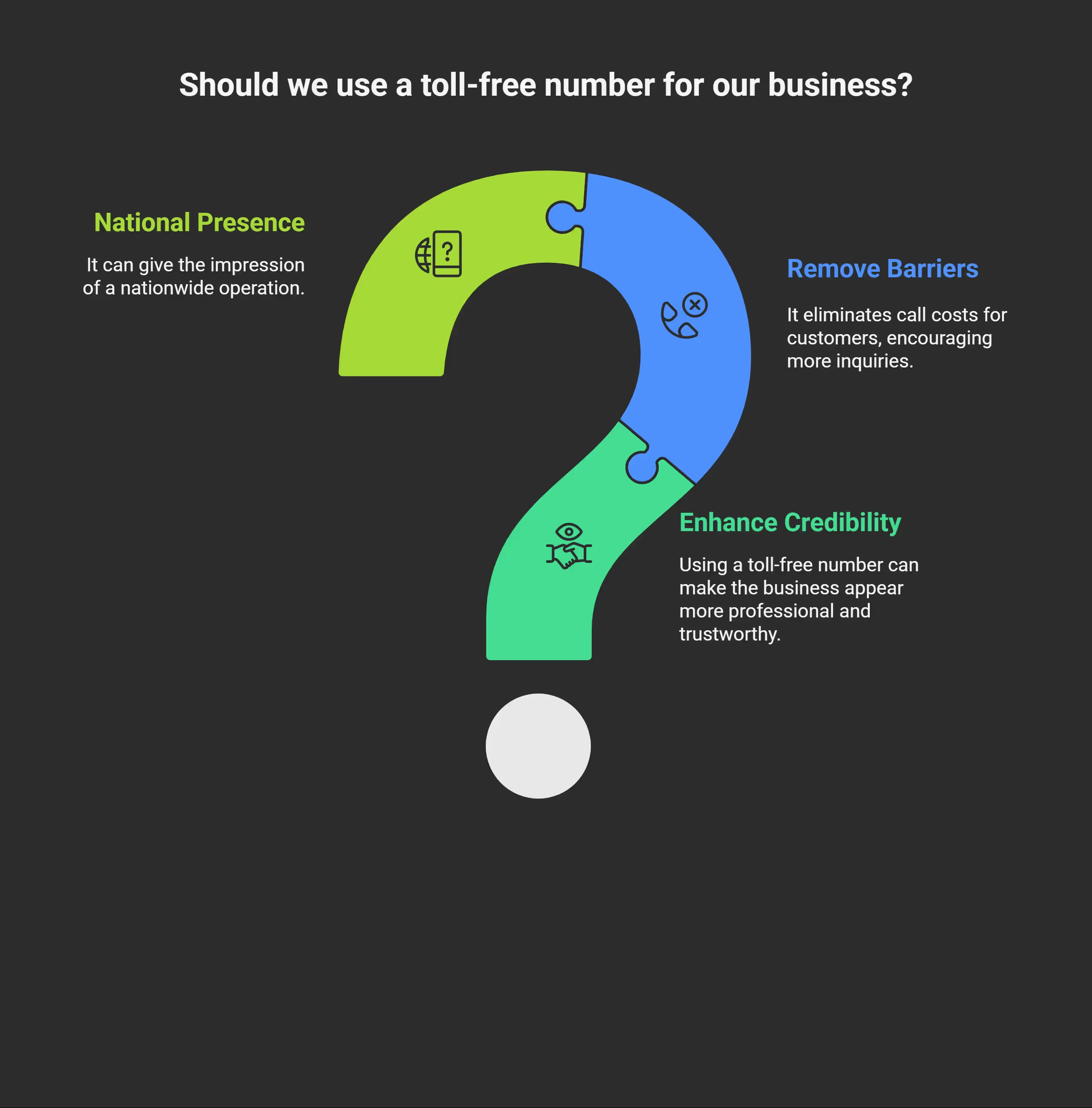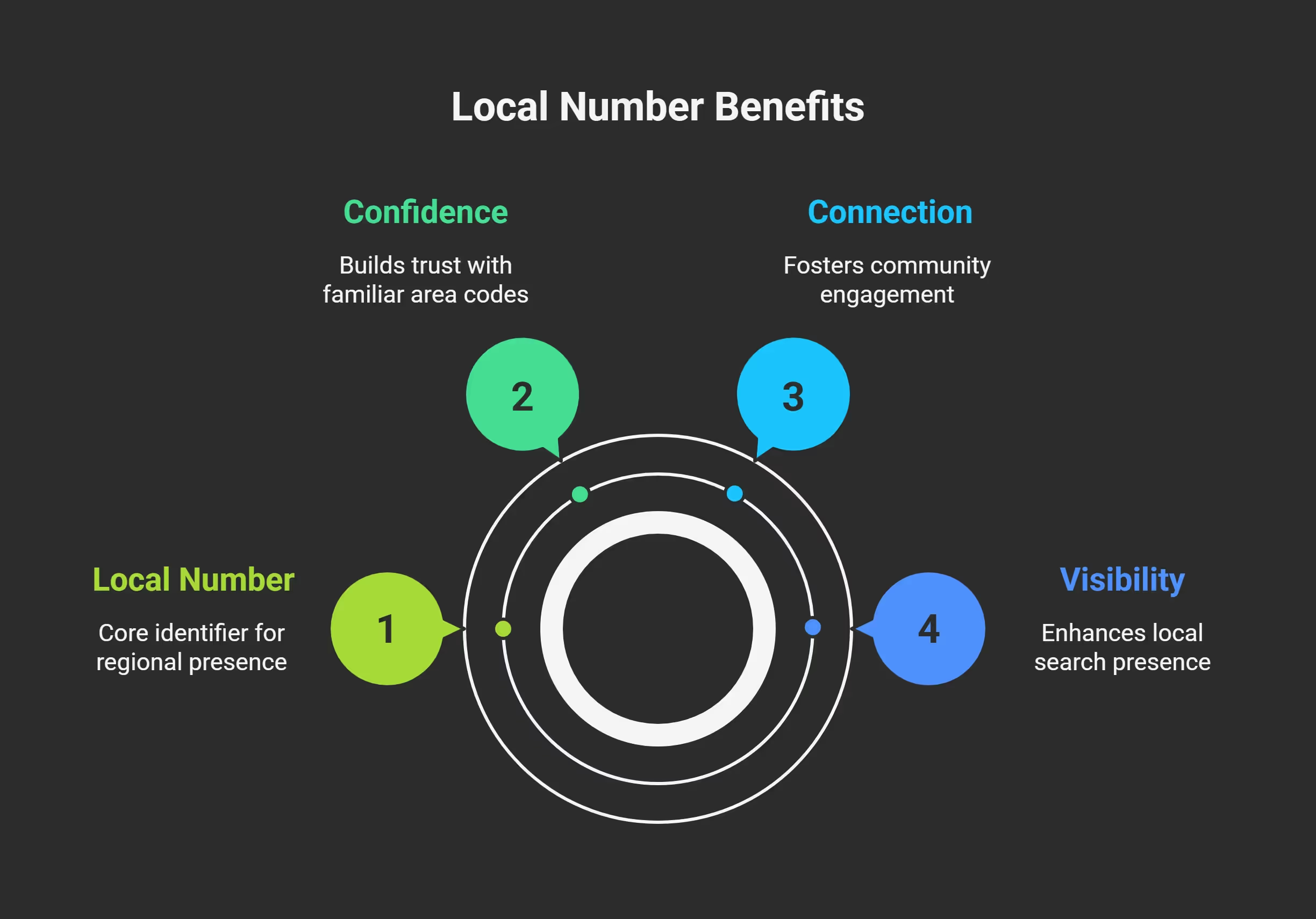
Difference Between Toll Free Number Vs Local Number
Summary:
Let’s be honest, most business owners don’t give much thought to their phone number. But it matters more than you’d think. A toll-free number makes you look bigger and more established. A local number makes you feel closer and more trustworthy to the people in your area.
There’s no “one size fits all” here. If you’re serving customers across the country, a toll-free number makes sense. But if you’re running a shop, service, or agency that depends on local trust, a local number hits differently.This post walks through both options, what each one says about your business, how they work, and when to use which. It’s simple, no-nonsense advice to help you make the right call.

If you're growing a business, you might overlook your phone number. But whether you go with a toll‑free number or a local number matters. The difference between toll‑free and local number setups affects credibility, cost, and customer behavior. Let’s break it down, clearly, conversationally, and with real advice so you can make the right choice for your business.
Toll Free vs Local Number: Which One Should Your Business Use?

Toll Free Numbers for Small Business: Benefits & Setup
Choosing between a local number vs toll free number depends on your audience and marketing strategy:
- Local numbers are perfect for community-focused businesses, improving trust, visibility, and call answer rates.
- Toll free numbers suit businesses aiming for a national presence, removing cost barriers for callers.
Many businesses combine both strategically:
- Use a toll free number on your website, email signatures, and national ads.
- Display a local number on Google Business listings and regional pages.
Other related queries to consider include:
- Toll free or local number
- Difference between toll free and local number
- Local and toll free numbers
It’s a business phone line that customers can call without paying for the call; the costs are absorbed by your business. In North America, toll‑free lines typically start with prefixes like confirm toll free number area codes such as 800, 855, 877, or 888.
When customers see a toll‑free prefix, many assume you’re national, professional, and accessible. Whether you’re offering nationwide services or fielding support inquiries, what a toll-free number becomes obvious: it's a way to boost trust and remove barriers to calling. Especially when people expect zero cost to call, toll‑free lines help bolster credibility.
How does it help your business?
- No cost for customers. That encourages more incoming calls.
- Professional, national image. Great for support lines or big‑brand positioning.
- Memorable vanity numbers. (Think 1‑800‑FLOWERS.)
- Scalable. It works consistently whether you get ten calls a day or ten thousand.
What Is a Local Number and Why Use One?

What is a local number?
It’s a phone number tied to a regional area code, like 213 for Los Angeles, 305 for Miami, or 617 for Boston. Seeing a familiar area code gives prospects confidence that you’re nearby and trustworthy.
For businesses rooted in a community, plumbers, local shops, and agencies, a local number builds instant connection. It improves visibility in local search and signals that you're part of the neighborhood.
Why use a local number?
- Local familiarity. Customers are more likely to answer a number they recognize.
- Local SEO boost. Google favors matching area codes in map listings.
- Lower cost. Usually included with VoIP or phone plans.
- Personable image. It says “neighborhood business,” not a big corporation.
Difference Between Local and Toll Free Number
Toll free numbers for small business provide several advantages:
- Builds a national, professional image.
- Encourages more incoming calls since customers aren’t charged.
- Memorable vanity numbers (like 1‑800‑FLOWERS).
- Scalable for growing call volumes.
Search available toll free numbers using your VoIP provider or online tools or an available toll free number search. It’s also important to verify whether numbers like 800, 855, 877, or 888 are toll free. Questions many businesses ask include:
- How to find toll free numbers
- What does toll free number mean
- How to get a toll free number for business
In short:
- Toll‑free numbers help project a national or professional image.
- Local numbers help you connect personally with clients in your area.
The real difference between toll‑free and local number use is about perception, not just who pays for the call.
If you're expanding outside your region, a toll‑free line signals you’re serious and accessible everywhere. But if your business thrives on local trust and neighborhood word‑of‑mouth, a local line shows you’re already there.
Toll‑Free vs Local Number: Comparison Table
Pros and Cons of Toll‑Free Numbers
Pros:
- Makes your business look larger and more established.
- Free for customers to call anywhere.
- Works well with national campaigns or service lines.
- Enables memorable vanity toll‑free numbers.
Cons:
- Higher cost per inbound call.
- It may feel impersonal for local customers.
- It can attract spam calls due to its broad reach.
- Doesn’t help local SEO visibility.
Pros and Cons of Local Numbers
Pros:
- Builds trust with local customers.
- Boosts visibility in local search results and maps.
- More cost‑effective, often included in voice plans.
- Area familiarity can improve answer rate.
Cons:
- Could limit perception of reach for national clients.
- Customers outside the area code may hesitate to call.
- Less memorable than toll‑free vanity numbers.
- Requires multiple local lines if serving many regions.
Adding Real‑Life Examples
Here are a couple of real‑world scenarios that highlight the difference between toll‑free and local number strategies:
- Example 1: A small boutique in Boston switched from an 800 toll‑free number to a local 617 number for their Google Business Profile. Within weeks, appointment calls rose by 25%, and locals preferred the recognizable Boston number.
- Example 2: A coaching business based in Seattle runs a toll‑free number on its homepage and ads, and a 206 local number on its blog posts and regional pages. That gave them national credibility, while also resonating personally with local leads.
How to Decide: 5 Key Questions
1. Where are most of your customers located?
- Spread across multiple states or regions? Use a toll‑free number.
- Primarily local? Stick with a local number for familiarity.
2. What image do you want to project?
- Big and polished? Toll‑free signals scale.
- Close and personal? Local lines feel relatable.
3. Where are you advertising?
- National ads or call‑tracking campaigns? Toll‑free is clearer.
- Local directories, Google Maps, local listings? Local numbers work better.
4. What’s your budget?
- Unlimited national calling? Expect higher costs with toll‑free.
- Cost‑effective VoIP or included plans? Local numbers may be free.
5. Want the best of both worlds?
Yes, many businesses run both:
- Put a toll‑free number on your website, email signature, or national ads.
- Display a local number on Google Business listings, city‑specific landing pages, and local flyers.
This hybrid approach uses toll‑free vs local numbers strategically, depending on where and how a customer finds you.
Choosing Between a Local and Toll‑Free Number: Final Tips
- Evaluate your audience location. If national or multi‑region, toll‑free suits. If local, go local.
- Match your marketing platform. Local ads work better with neighborhood numbers.
- Test and learn. Try AB‑testing call tracking: use a toll‑free number on one campaign and a local number on another. See which converts better.
- Scale as you grow. You can start local and add a toll‑free as you expand or vice versa.
Local Number vs Toll Free: Choosing the Right Option
At the end of the day, the difference between toll‑free and local numbers is less about functionality and more about brand perception and customer behavior.
- Choose toll‑free if you’re scaling across regions, want to signal national professionalism, or handle high‑volume support lines.
- Choose local if you want trust, local SEO, and a down‑to‑earth connection with your community.
- Or best of both: use both wisely, toll‑free on general marketing and national touchpoints, local on regional pages, maps, and neighborhood ads.
Final Decision: Make It Intentional
Toll‑free or local? Both have their place. The best choice depends on your audience, marketing strategy, and brand image. Some businesses exclusively use one; others use both for maximum flexibility.
Remember: the difference between toll‑free and local numbers is strategic, not accidental. Choose intentionally, and update as your business grows.
Need help choosing the right number for your business? Talk to our team to get expert guidance and set up your local or toll-free number in minutes. Get Started with Power Dialer
FAQs:
Is a toll‑free number always better than a local number?
Not always. The difference between toll‑free and local numbers is situational. Toll‑free works for national presence; local works when trust and familiarity are priorities.
What is a toll-free number used for?
It’s most often used for customer support, orders, and national marketing, especially when you want callers to feel no financial barrier to calling.
What is a local number used for?
What is a local number used for? It enhances local visibility, boosts map listings and trust, and resonates most with community‑focused businesses.
Can I switch from local to toll‑free later?
Yes. Most phone providers allow porting or call forwarding from local to toll‑free and vice versa. That flexibility means you can start one way and expand as needed.
Can I use both simultaneously?
Absolutely. Many businesses display a toll‑free number on their website and broad ads, while using a local number for specific cities or Google Business listings. This hybrid use effectively leverages toll‑free vs local numbers depending on the audience and channel.
